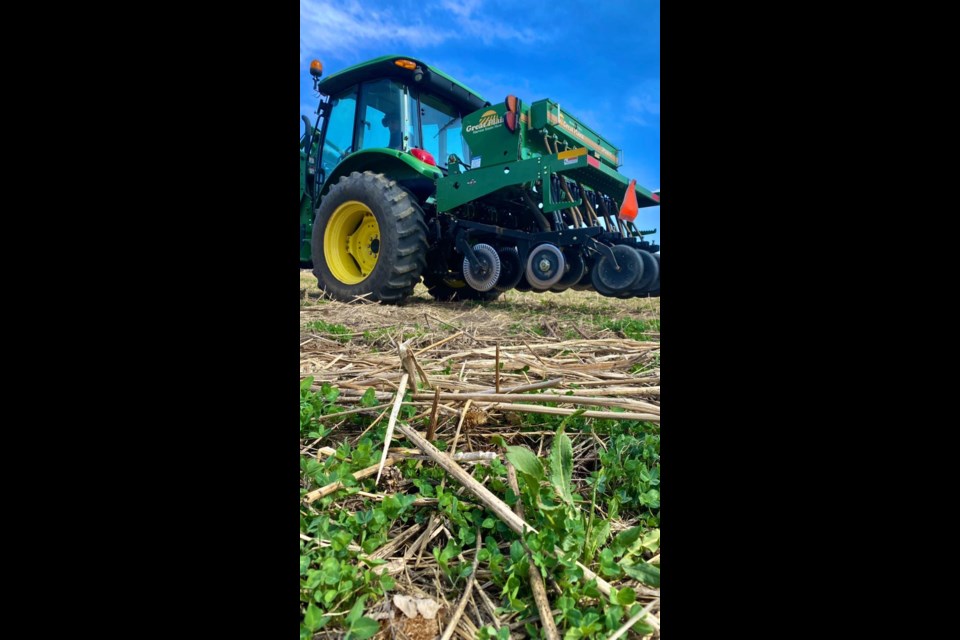The team at Ollin Farms broke ground at the farm’s research fields last week to plant cover crops that will continue to support projects for soil health and pollinator habitats this season.
A family farm located in south Longmont, Ollin Farms grows fruits and vegetables while raising sheep, chickens and honey bees. The farm strives to produce healthy, nutrient dense products through sustainable agricultural practices.
In 2020, owners Mark and Kena Guttridge began leasing 135-acres of Boulder County Open Space in the southwest corner of Longmont. Since then, they have partnered with organizations across the county and state to develop a plan to heal the soil and implement conservation practices that will bring vitality back to the land, according to the website.
That is how Project 95 was born.
“(We) chose that (Project 95) as an umbrella to pull all the stuff going on at the farm that was not vegetable growth and distribution,” Mark Guttridge said. “There is much happening around education, food access to low income (families), research, and sustainable farming, so we’ve been partnering with different organizations to get resources to get innovative conservation practices going on our farm and open space lands.”
In celebration of Earth Day 2021, Guttridge will unveil a new website fully dedicated to Project 95 in hopes of continuing to grow the public’s knowledge and support to tackle bigger projects, he said.
“When we think about protecting the earth, agricultural sites and farms don't usually come to mind but I think that they should,” said Tracy Halward, faculty member at the University of Colorado and volunteer with Wildlands Restoration Volunteers, or WRV. “They play an important role in providing habitat for wildlife and pollinators, and enhancing carbon dioxide sequestration.”
Halward has been leading the planting efforts of cover crops at Ollin Farms since 2020, an effort, she says, will support building wildlife habitat and draw pollinators back into this open space.
“Project 95 will serve as an educational tool to other farms and the community,” Halward said. “It doesn’t have to be either/or, either agriculture or open space. We can combine aspects of a healthy native ecosystem into agricultural farms.”
Traditional agriculture relies heavily on monoculture systems depleting the soil and stripping it of native fauna and flora, according to Guttridge. Through the reintroduction of native perennials and the seeding of diverse crops, farmlands can become healthy ecosystems that produce nutrient-dense food, he said.
Soil does not only affect the quality of the crops it produces, it also has an impact on the habitat of wildlife and pollinators, contributing to the climate crisis, according to Joyce Kennedy, outreach and advocacy coordinator at People and Pollinators Action Network, or PPAN.
“We have already disturbed so much land that pollinators don’t have the amount of food they need, climate change is impacting them and pesticides are weakening them,” she said. “Both (biodiversity and pollinators) are so important for our health and wellbeing in the future… and we need to work hard to recuperate what we have lost.”
PPAN has partnered with Ollin Farms to bring pollinators back into the region as part of Project 95 by providing planting volunteers, technical assistance and advocacy support.
“Overall, we are thinking about how properties can be connected through a pollinator-safe communities program,” Kennedy said. “It’s for any land manager or farmer who is thinking about incorporating these sorts of important pollinator supportive measures… just planting pollinator friendly plants and not using pesticides.”
In the 1910s and 1920s, the agricultural center of the city and the area was located on the south side of Longmont by 95th St., where Ollin Farms is located. This is where the name Project 95 comes from, Guttridge said.
“We wanted to establish the south side of Longmont as a learning center for regenerative agriculture and community-based farming initiatives and education,” he said. “I realized I was wasting so much time trying to change the system from the inside and thought the most important thing I can do is to build an alternate reality and policy will follow.”
Through the work at the farm, Guttridge wants to establish a new paradigm and trusts that once others see what is possible, they will follow, he said. “We don't have a choice, we cannot keep farming the way we have or we are not going to have any farmland left."
To commemorate Earth Day, Guttridge will be participating today at 6:30 p.m. in an online event organized by Central Longmont Church to discuss regenerative farming after the viewing of the movie Kiss the Ground.
Guttridge will also join local scientists and experts on Apr. 22 at 7:30 p.m. in a virtual panel discussion by the Longmont Museum about climate change and the need for innovative solutions as part of its climate series.



